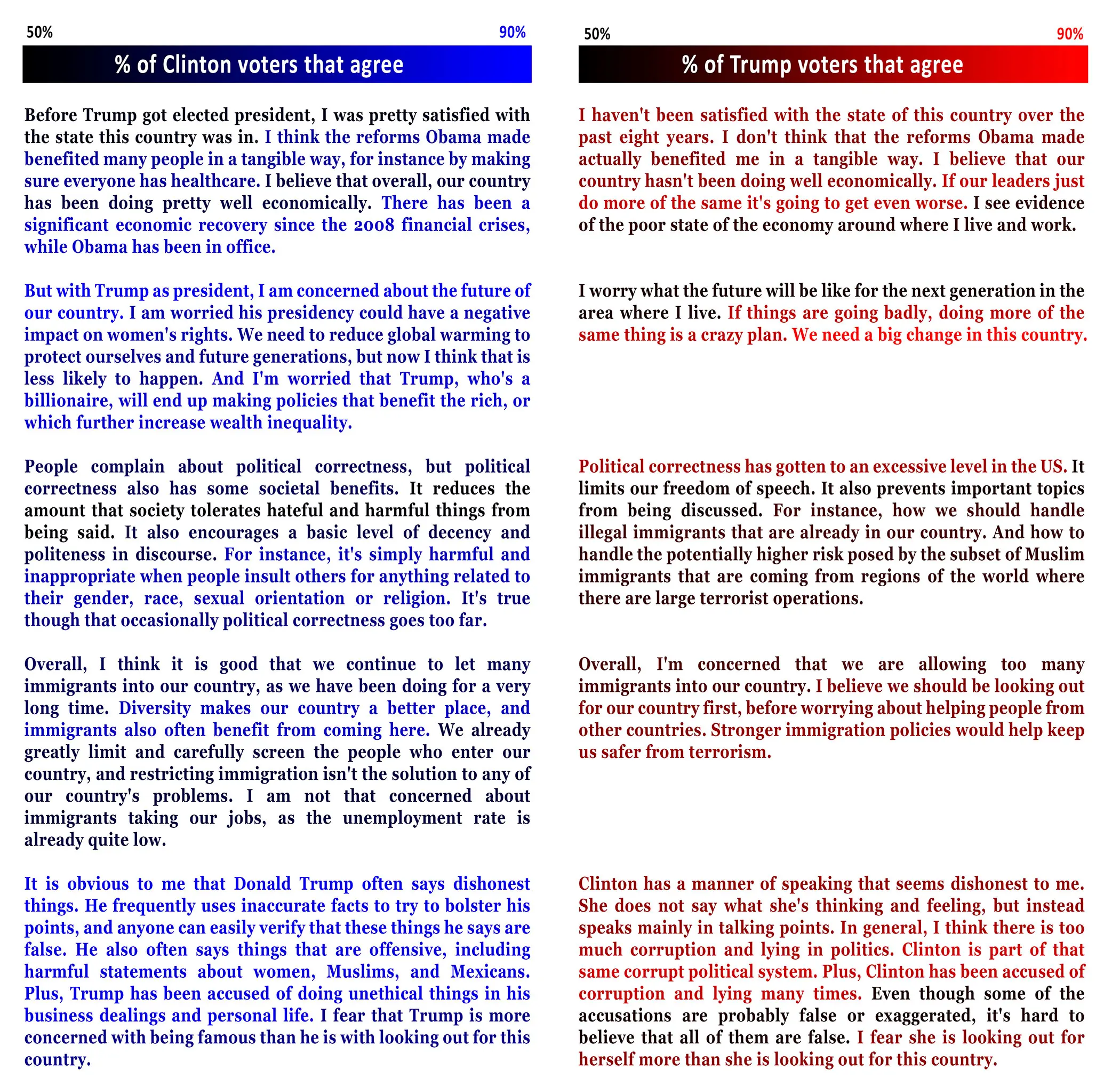Tensions are running higher than usual these days.
In addition to the everyday disagreements we have with our friends, family, and coworkers, the brutal election over the last year appears to have ripped the country in two, with liberals and conservatives unable to see eye to eye. In addition to everyday arguments at the office about which marketing idea was better or how much to spend on a colleague’s baby shower, those on opposite sides of the political divide feel anger, resentment, and animosity toward one another. Heated emotions are bubbling to the surface.
Spencer Greenberg, founder and CEO of Clearer Thinking, a non-partisan organization that conducts research on decision-making and creates free tools for the public, sees our current state of discord as an opportunity to learn to be more empathetic. He’s been developing strategies for helping Clinton and Trump supporters to better relate to one another.

Empathy, it is a learned trait. Our ability to put ourselves in someone else’s shoes to understand how they are thinking or feeling can be developed and trained. According to Daniel Batson, a professor emeritus at the University of Kansas, empathy has been used as a tool in peacekeeping for years. “People have used it to achieve important goals,” he says. “It has been used to bring together Palestinian and Israeli leaders. The Helsinki Accords came out of a conflict-resolution workshop that relied on empathy exercises.”
At a recent Clearer Thinking event in New York after the election, Greenberg issued a challenges to his audience, which consisted of both Trump and Clinton supporters: Try to state the position from someone from the opposite side of the political divide so accurately and comprehensively that they agree you’ve captured their view. In fact, you’ll know you’ve succeeded if you can express their position so clearly, vividly, and fairly that they say, “Thanks, I wish I’d thought of putting it that way.”
This is a strategy that was developed by a social psychologist Anatol Rapoport, who made the case that the only way to fruitfully engage with someone who has different beliefs from you is to re-express their beliefs, list points of agreements and things you may have learned from them, then go on to express your position.
At the event, Clinton and Trump voters had the opportunity to write short essays that required them to step in the shoes of someone from the other side and try to see the world from their perspective. Clinton supporters, writing as Trump supporters, included lines like, “I worry what the future will be like for the next generation in the area where I live. If things are going badly, doing more of the same thing is a crazy plan. We need a big change in this country.” Conversely, Trump supporters, writing as a Clinton supporters, wrote things like, “Overall, I think it is good that we continue to let many immigrants into our country, as we have been doing for a very long time. Diversity makes our country a better place, and immigrants also benefit from coming here.”

Greenberg himself took part in this exercise. As a Democrat, he was writing from the perspective of someone who’s supported Trump. “Empathizing with another person does not imply you agree with them, it means you can see why someone in their position with their experiences would feel the way that they feel,” he says. “Personally, what I find especially valuable about the process of writing an essay from another person’s perspective, is that it pushes you to go beyond merely a dispassionate understanding, towards actual empathy. All too often the opposing side is dehumanized, and empathy is the antidote to dehumanization.”

Related: Escape Your Echo Chamber And Understand What Really Makes Trump Supporters Tick
If you are feeling particularly angry with people who voted differently from you or if you feel confused about their motivations, you might want to give the exercise a try. You could then ask someone you know from the other side to read it and provide their thoughts. It would allow you to start a conversation on the right foot, and it also paves the way for you to explain your own position to the other person effectively. “If you can simulate the valid feelings experienced by those on the opposing side, even just for a flickering moment, and even if in the end you still think they are very much mistaken, then you’ve made progress towards the possibility of beneficial cooperation,” Greenberg says.
Batson, the psychology professor, agrees that this exercise can be good for dealing with misunderstandings between people, if misunderstandings are indeed the basis of conflict. However, he points out that there are limits to what exercises like this can accomplish. “It can lead to a clarification of the other person’s position,” he says. “But someone else’s position might be morally questionable. If someone has a truly despicable attitude, for me to know that they have those attitudes doesn’t change anything.” He points out that if someone else has racist beliefs, you might be able to state their reasoning, but it won’t necessarily bridge the gap between you.
For Greenberg, this exercise is particularly helpful in the case of a widespread political divide in the country, because there are clearly reasonable and moral people on both sides of the fence. The goal is to try and empathize with those people.
But the exercise has applications beyond politics. The next time you are experiencing conflict with a coworker, a friend, or a family member, try sitting down and writing down their position in terms they can agree with. At very least, this might make you feel less antipathy toward them, at best, you might be on your way to arriving at a productive compromise you are both happy with.
Recognize your brand’s excellence by applying to this year’s Brands That Matter Awards before the early-rate deadline, May 3.
